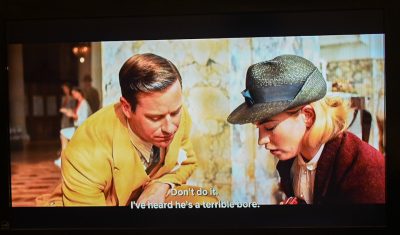The 2020 film “Rebecca” is, in a word, shallow. Or stuffy. Or static. The Netflix Original, released Wednesday, is a remake of Alfred Hitchcock’s 1941 Best Picture, but the films can barely be put in the same category.

Armie Hammer, who plays Maxim de Winter, and Lily James, who plays his bride, star opposite in this psychological romantic thriller. With this genre in mind, it was hard to place the movie’s intended vibe — the movie threw in an awkwardly long sex scene, some weirdly placed folk-style music, along with sun-soaked travel scenes of Europe juxtaposed against the dark halls of the de Winter estate, which all seemed disjointed.
After spending a week together, de Winter proposes to “Mademoiselle,” whom the subtitles later dub her “Mrs. de Winter” — we never learn her first name. She is replacing the shadow of Mr. de Winter’s late first wife, Rebecca. The late Mrs. de Winter’s reputation follows the couple everywhere, and his new bride lets it get to her. However, this unnamed woman has no real defining traits that show her main goals, and her chemistry with Hammer was not convincing.
Not that James was to blame for it — Hammer had a noticeably fake British accent to go with a stiff, unromantic performance. His character didn’t really convince me of the grieving husband, whose wife died suddenly a year earlier, or even of a suspected wife murderer, later. He was Armie Hammer, looking like a rich, attractive “Englishman,” but not much more.
While the beginning of the film is all bliss, beautiful French travel spots with soft lighting, making James look right out of her 2015 film “Cinderella,” the viewers weren’t given a glimpse of the inner workings of the blossoming relationship. It was the best week of their lives, James tells Hammer. I wasn’t convinced, but it was enough for a rushed marriage proposal when James, of lower class, would have forced their separation for work.
At this point, the movie had mentioned his late wife Rebecca numerous times. She was brought up in almost every scene, which effectively placed her as a main character with no screen time. Her shadow was there, in his Manderly estate, in Mr. de Winter, in the minds of everyone.
There were some moments when the housekeeper, Mrs. Danvers, or other men disclosed obsessive thoughts over Rebecca. It was a bit overwhelming, turning Rebecca from an immortal goddess to a weird idol.
The film’s intention was perhaps to characterize Rebecca as unattainable, and James’s character was even told that she would never measure up. Yes, this was effective — Rebecca lingered everywhere. However, by the 15th or 20th time she’s brought up, the viewer begins to feel a bit apprehensive. The idolization of this woman turned from loyal to creepy.
Things get a bit better as the new Mrs. de Winter settles into Manderly and takes up responsibilities of the wife, which mainly involves hosting balls She struggles with filling the shadow of Rebecca, but her social class leaves her unequipped for the job anyway. After the housekeeper tricks her into dressing as Rebecca for the ball, things quickly rebound for the young bride as she navigates her husband’s resistance to discuss Rebecca around people who seemingly know everything about her life and death.
Now that Mrs. de Winter has married and settled in, she seems to find little interest in spending time with her new husband, depriving the film of a connection between two major characters and any motivation for her to continue living with Rebecca’s ghost. Their proclamation of love felt ingenuine and any scene they had together was fraught to a fault with the awkwardness of her missteps.
Things break down when Rebecca de Winter’s body is found in the sea next to Manderly. We see her thick black hair hang out of a soaking wet body bag, which contradicts what Maxim said when he identified a body they found two months after her initial disappearance.
He breaks down immediately to Mrs. de Winter, showing trust in a bond that wasn’t too obvious, and she decides they are going to fight the new inquisition into ruling her death foul play or suicide.
At the beginning of the film, the point of tension came from the new Mrs. de Winter’s social class and Maxim’s grieving, and by the end, the genre itself had completely changed. While predictability isn’t the goal, the objective of the movie moved so much that the mood could never be placed.
The movie turned from romantic, psychological thriller to a legal drama. With courtroom scenes, a lot of screaming and crying and a surprising end, it ticked all the boxes. While the legal business turned interesting, the mystery behind Rebecca’s ghost disappears and it loses its psychological anything.
While it ended on a more interesting note, “Rebecca” was not worth the remake. It lost its 1940 charm and instead took on a shallow, sorry execution of a modern take without one solid direction.














